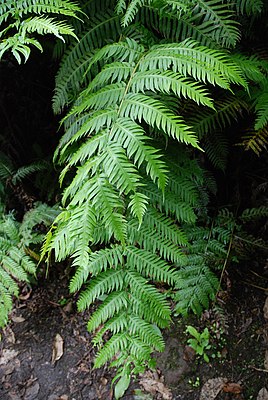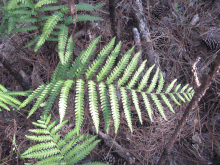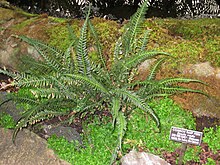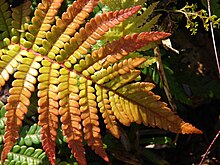Rib fern family
| Rib fern family | ||||||||||||
|---|---|---|---|---|---|---|---|---|---|---|---|---|

Rooting chain fern ( Woodwardia radicans ) |
||||||||||||
| Systematics | ||||||||||||
|
||||||||||||
| Scientific name | ||||||||||||
| Blechnaceae | ||||||||||||
| Newman |
The rib fern family (Blechnaceae) are a family of plants within the real ferns (Polypodiopsida).
features




They are perennial herbaceous plants . The rhizomes are creeping, ascending or upright, sometimes trunk-shaped. They often form runners . The tip of the rhizome is covered with scales.
The petiole has numerous round vascular bundles that are arranged in a ring. The leaves are monomorphic or dimorphic. The nerves are pinnate or bifurcated, terminate freely or anastomose .
On the fertile leaves, the nerves form rib-shaped areoles in which the sori stand. The sori are arranged in chains or lines, often parallel and close to the midribs. They have elongated indusia that open towards the midrib. The sporangia have three-row, short to long stems. The spores are kidney-shaped, monolet (a scar) and have a winged perispora .
The gametophyte is green and heart-shaped.
The basic chromosome number is x = 27, 28, 31 to 37, or 40.
Systematics and distribution

The Blechnaceae family was founded in 1844 by the English entomologist , botanist and writer Edward Newman (1801–1876) in A History of British Ferns. 2nd edition, p. 8 set up. The Blechnaceae family is monophyletic .
The Blechnaceae family is found almost worldwide. The center of biodiversity is in tropical areas of the southern hemisphere . In China there are about eight genera with about 14 species, one of them only there.
The Blechnaceae family contains two to 29 genera with around 250 species, depending on the author:
-
Anchistea
C. Presl : There is only one type:
- Anchistea virginica (L.) C. Presl (Syn .: Woodwardia virginica (L.) Sm. ): It occurs in eastern Canada, in the eastern United States and in Texas.
- Austroblechnum Gasper & VAODittrich It wasspun offfrom the Blechnum genus.
-
Blechnidium T.Moore : There is only one type:
- Blechnidium melanopus (Hook.) T.Moore (Syn .: Blechnum melanopus Hook. , Blechnum plagiogyriifrons Hayata , Blechnidium plagiogyriifrons (Hayata) Hayata ): It occurs in India , Myanmar , Taiwan and in the Chinese provinces of Guizhou ( guiding only) and Yunnan in front.
- Blechnopsis C.Presl It was in the genus Blechnum outsourced.
- Rib ferns ( Blechnum L. ): Depending on the author, there are a few to about 220 species, mainly in the southern hemisphere.
-
Brainea J.Sm. : This isolated genus contains only one species:
- Brainea insignis (Hook.) J.Sm. : It is widespread in Asia.
- Chieniopteris Ching : It contains only two species in China, Vietnam and Japan. Some authors put them on Woodwardia .
-
Cleistoblechnum Gasper & Salino It contains only one species:
- Cleistoblechnum eburneum (Christ) Gasper & Salino (Syn .: Blechnum eburneum Christ ): It occurs in China and Taiwan.
- Cranfillia Gasper & VAO Dittrich It was separated from the genus Blechnum .
- Diploblechnum Hayata : It contains about eight species.
- Doodia R.Br. : The one to eleven species occur from Sri Lanka to Australia .
-
Icarus Gasper & Salino : It contains only one species:
- Icarus filiformis (A.Cunn.) Gasper & Salino (Syn .: Lomaria filiformis A.Cunn. )
- Lomaria Willd. (Syn .: Stegania R.Br. )
- Lomaridium C. Presl . With about 18 species.
- Lomariocycas (J. Sm.) Gasper & AR Sm . It contains about 20 species.
- Lorinseria C. Presl
-
Neoblechnum Gasper & VAODittrich It contains only one type:
- Neoblechnum brasiliense (Desv.) Gasper & VAODittrich (Syn .: Blechnum brasiliense Desv. ): It occurs in Guatemala and South America.
- Oceaniopteris Gasper & Salino It was separated from the genus Blechnum .
- Parablechnum C.Presl With numerous species. It was separated from the genus Blechnum .
- Pteridoblechnum Hennipman : Of the at most one or two species, one is also assigned to Diploblechnum .
- Sadleria Kaulf. : The six or so species are only found in Hawaii .
- Salpichlaena J.Sm. : The three or so species are distributed from tropical Central to South America.
-
Steenisioblechnum Hennipman : There are at most one or two types, including:
- Steenisioblechnum acuminatum (CTWhite & Goy) Hennipman : It occurs only in the Australian state of Queensland . One of the species is also put to Diploblechnum .
- Stenochlaena J.Sm. (Syn .: Lomariobotrys Fée ): The approximately six kinds in tropical areas in Africa, Asia, Australia and on Pacific islands before.
-
Struthiopteris Scopoli (Syn .: Homophyllum Merino , Spicanta C.Presl , Spicantopsis Nakai ): The ten species are distributed mainly in the temperate regions of the northern hemisphere and in Australia. They were separated from the genus Blechnum . Only one species occurs in Europe:
- Rib fern ( Struthiopteris spicant (L.) Weis , Syn .: Blechnum spicant (L.) Roth )
- Telmatoblechnum Perrie et al. It was separated from the genus Blechnum .
- Chain ferns ( Woodwardia Sm. ): The ten or so species are mainly found in the temperate to tropical areas in Eurasia and from North to Central America ; there are five types in China. This belongs here:
swell
literature
- Alan R. Smith, Kathleen M. Pryer, Eric Schuettpelz, Petra Korall, Harald Schneider, Paul G. Wolf: A classification for extant ferns. In: Taxon. Volume 55, No. 3, 2006, ISSN 0040-0262 , pp. 705-731, (abstract, PDF file) .
- Wang Faguo, Fuwu Xing, Shiyong Dong, Masahiro Kato: Blechnaceae , pp. 411-414 - online with the same text as the printed work , In: Wu Zheng-yi, Peter H. Raven, Deyuan Hong (eds.): Flora of China. Volume 2-3: Lycopodiaceae through Polypodiaceae. Science Press and Missouri Botanical Garden Press, Beijing and St. Louis, 2013, ISBN 978-1-935641-11-7 .
Individual evidence
- ↑ a b c d e f g h i j k Wang Faguo, Fuwu Xing, Shiyong Dong, Masahiro Kato: Blechnaceae , p. 411-414 - online with the same text as the printed work , In: Wu Zheng-yi, Peter H. Raven, Deyuan Hong (Ed.): Flora of China. Volume 2-3: Lycopodiaceae through Polypodiaceae. Science Press and Missouri Botanical Garden Press, Beijing and St. Louis, 2013, ISBN 978-1-935641-11-7 .
- ^ Alan R. Smith, Kathleen M. Pryer, Eric Schuettpelz, Petra Korall, Harald Schneider, Paul G. Wolf: A classification for extant ferns. In: Taxon. Volume 55, No. 3, 2006, ISSN 0040-0262 , pp. 705–731, (Abstract, ( Memento of the original dated February 12, 2017 in the Internet Archive ) Info: The archive link has been inserted automatically and has not yet been checked. Please check Original and archive link according to instructions and then remove this note. PDF file) .
- ↑ a b c d e f g h i j k l m n o p q r s t u v w Blechnaceae in the Germplasm Resources Information Network (GRIN), USDA , ARS , National Genetic Resources Program. National Germplasm Resources Laboratory, Beltsville, Maryland. Retrieved April 8, 2019.
- ↑ a b c d e f g h i j k André Luís de Gasper et al .: A classification for Blechnaceae (Polypodiales; Polypodiopsida); New genera, resurrected names and combinations. In: Phytotaxa , Volume 275, Issue 3, 2016, pp. 191-227.
- ^ A b M. Christenhusz, E. von Raab-Straube (2013): Polypodiopsida. : Datasheet Woodwardia In: Euro + Med Plantbase - the information resource for Euro-Mediterranean plant diversity.
- ↑ André Gilles Célestin Lawalrée: Woodwardia Sm. In: TG Tutin, NA Burges, AO Chater, JR Edmondson, VH Heywood, DM Moore, DH Valentine, SM Walters, DA Webb (eds.): Flora Europaea . 2nd, revised edition. Volume 1: Psilotaceae to Platanaceae . Cambridge University Press, Cambridge / New York / Melbourne 1993, ISBN 0-521-41007-X , pp. 31 (English, limited preview in Google Book Search).
Web links
- Raymond B. Cranfill: Blechnaceae C. Presl - the same text online as the printed work , In: Flora of North America Editorial Committee (Ed.): Flora of North America North of Mexico. Volume 2: Pteridophytes and Gymnosperms. Oxford University Press, New York and Oxford, 1993, ISBN 0-19-508242-7 .


